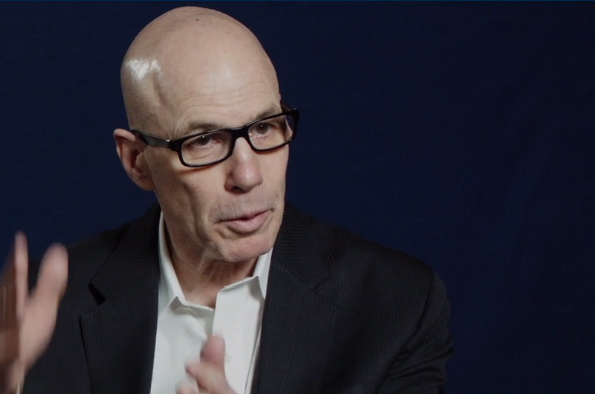Since taking the helm at Thomas Jefferson University and Thomas Jefferson University Health System in 2013, Stephen Klasko, MD, has grown the health system from a $1.5 billion provider into a $6 billion organization on its way to $9 billion.
Half a dozen mergers later, and today’s Thomas Jefferson boasts a university with fashion and design expertise, innovative relationships with the startup community, and what Klasko calls the new math of health care. That’s just a start.
Health Evolution Editor-in-Chief Tom Sullivan spoke with Klasko about that journey, the risks he took to achieve it, what makes him the most proud, a former Apple CEO mentor and his priorities for the next three to five years.
Q: Let’s jump right in. What is the biggest business risk you’ve taken as CEO? What was the pay off?
A: The one that almost got me committed to a psychiatric institute was acquiring Philadelphia University, which was focused on fashion and design. That was a huge ‘what does that have to do with anything?’ There’s always that fine line between crazy and visionary — and that one got me into crazy territory. But now we have the first medical school curriculum in design thinking, and an explosion of creativity between architecture, fashion, design and health.
But the riskiest thing I did by far was in the first two months here. We were a merged entity with Main Line Health but all our insurance and bonding were run by the holding company. I recognized we couldn’t do some of the things we talked about so I had to go to the board and convince them to take $356 million out and leave a safe haven. I could’ve been the shortest president in the history of the university.
Q: Now let’s look back. You’ve been with CEO of Thomas Jefferson since 2013 and you were CEO of USF Health before that. What are you most proud of?
A: What I’m most proud of is that we’ve been able to take a no limits approach. Things that people said were impossible, we did them.
At USF we started a technical competence assessment center and built the largest simulation center in the country. We also partnered with The Villages on a totally patient-driven system owned by consumers rather than the hospital.
At Thomas Jefferson, I’m proud we went from $1.5 billion to what will be a $9 billion organization by merging community assets into one group. We’ve undergone 6 mergers without writing a check – all trading governance as currency.
We also created what I call the new math. The old math includes the academic and the clinical. The new math is innovation + strategic ventures + philanthropy.
Q: What are some of the other innovative undertakings at Jefferson?
A: We have a smart cities initiative, and we’ve become a go-to place for large startup VCs. While we don’t have our own venture fund, we have a whole budget for these kinds of deals – everything we invest in we use. They don’t all work and that’s fine. Then you have the Livongo and Ecofibre of the world that are much more valuable. We also partnered with MindStrong, digital footprinting for serious mental illness.
This year will be the first year where the operating income from the innovation matches our hospitals. There’s going to be a trillion spent on transforming health care and we can be a part of that.
Q: Who are some of your mentors outside health care?
A: One of my mentors is John Sculley, who came into Apple to babysit Steve Jobs. “You have to stop talking about telehealth, nobody talks about tele-banking,” Sculley told me. So we’re moving to Jefferson With No Address.
Second thing I learned from him is that when your ecosystem is going through a once in a lifetime change, your biggest threat is thinking incrementally. When Jobs looked out 10 years, it wasn’t at future laptops and operating systems – it was at the entirely new iPhone.
Q: When you look three to five years into the future, what are your top priorities?
A: Consumerization, AI, educating doctors, and value-based care. The health care ecosystem is incredibly broken. Just giving more people access to an inequitable and sometimes unsafe system is not the answer.
For Thomas Jefferson, a fundamental change underpins everything we do: transforming from a hospital company to health care with no address – to deliver care the way we consume just about everything else, at home or close to home.
If I don’t move 180 degrees I’m going to be part of a dying breed. Given that I believe a good part of health care will be at home, and involve artificial intelligence and machine learning, how do I fundamentally change the way I educate doctors?
It used to be if I could memorize more stuff I’d be a better doctor – but there will be a robot next to me soon that memorizes better than I do.
And to quote Upton Sinclair: “It is difficult to get a man to understand something when his salary depends on his not understanding it.” We need to recognize that as much as we like to talk about value and the way we get paid, the reality is we’re still at less than 10 percent of actual income based on value.










